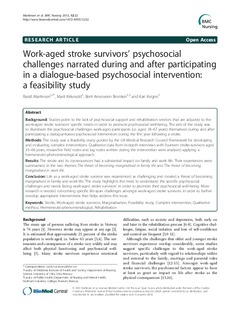| dc.contributor.author | Martinsen, Randi | |
| dc.contributor.author | Kirkevold, Marit | |
| dc.contributor.author | Bronken, Berit Arnesveen | |
| dc.contributor.author | Kvigne, Kari | |
| dc.date.accessioned | 2014-01-29T13:49:56Z | |
| dc.date.available | 2014-01-29T13:49:56Z | |
| dc.date.issued | 2013 | |
| dc.identifier.citation | Martinsen, R., Kirkevold, M., Bronken, B.A. & Kvigne, K. (2013). Work-aged stroke survivors psychosocial challenges narrated during and after participating in a dialogue-based psychosocial intervention: a feasability study. BMC Nursing 12(22). doi: 10.1186/1472-6955-12-22 | no_NO |
| dc.identifier.uri | http://hdl.handle.net/11250/134606 | |
| dc.description | Vitenskapelig, fagfellevurdert artikkel | no_NO |
| dc.description.abstract | Background: Studies point to the lack of psychosocial support and rehabilitation services that are adjusted to the
work-aged stroke survivors’ specific needs in order to promote psychosocial well-being. The aim of the study was
to illuminate the psychosocial challenges work-aged participants (i.e. aged 18–67 years) thematised during and after
participating a dialogue-based psychosocial intervention during the first year following a stroke.
Methods: The study was a feasibility study guided by the UK Medical Research Council Framework for developing
and evaluating complex interventions. Qualitative data from in-depth interviews with fourteen stroke-survivors aged
33–66 years, researcher field notes and log notes written during the intervention were analysed applying a
hermeneutic-phenomenological approach.
Results: The stroke and its consequences had a substantial impact on family and work life. Their experiences were
summarised in the two themes The threat of becoming marginalised in family life and The threat of becoming
marginalised in work life.
Conclusion: Life as a work-aged stroke survivor was experienced as challenging and created a threat of becoming
marginalised in family and work life. The study highlights the need to understand the specific psychosocial
challenges and needs facing work-aged stroke survivors’ in order to promote their psychosocial well-being. More
research is needed concerning specific life-span challenges amongst work-aged stroke survivors in order to further
develop appropriate interventions that helps address this issue. | no_NO |
| dc.language.iso | eng | no_NO |
| dc.publisher | BioMed Central | no_NO |
| dc.relation.uri | http://www.biomedcentral.com/ | |
| dc.relation.uri | http://www.biomedcentral.com/bmcnurs/ | |
| dc.subject | stroke | no_NO |
| dc.subject | work-aged | no_NO |
| dc.subject | stroke survivors | no_NO |
| dc.subject | marginalisation | no_NO |
| dc.subject | feasability study | no_NO |
| dc.subject | complex intervention | no_NO |
| dc.subject | qualitative method | no_NO |
| dc.subject | hermenutic-phenomenological | no_NO |
| dc.subject | rehabilitation | no_NO |
| dc.title | Work-aged stroke survivors psychosocial challenges narrated during and after participating in a dialogue-based psychosocial intervention: a feasability study | no_NO |
| dc.type | Journal article | no_NO |
| dc.type | Peer reviewed | no_NO |
| dc.subject.nsi | VDP::Medical disciplines: 700::Health sciences: 800 | no_NO |
| dc.subject.nsi | VDP::Medical disciplines: 700::Health sciences: 800::Nursing science: 808 | no_NO |
| dc.source.volume | 12 | no_NO |
| dc.source.journal | BMC Nursing | no_NO |
| dc.source.issue | 22 | no_NO |
| dc.identifier.doi | 10.1186/1472-6955-12-22 | |
